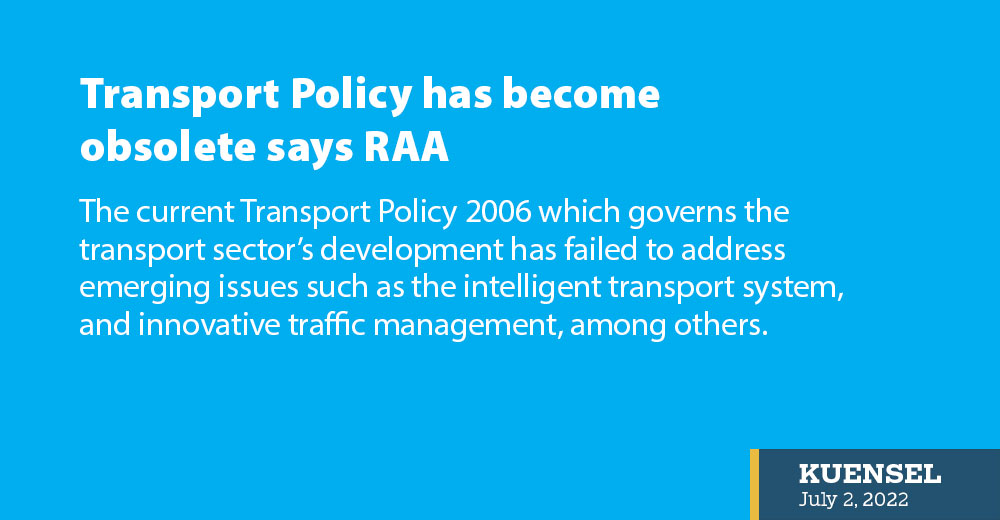Chhimi Dema
The current Transport Policy 2006 which governs the transport sector’s development has failed to address emerging issues such as the intelligent transport system, and innovative traffic management, among others.
The Royal Audit Authority (RAA) in its performance audit on the safe and sustainable road transport system uncovered these issues.
The report released on June 30 stated that there was a need to draw a comprehensive surface transport policy to ensure consolidated approaches to developing the transport sector.
“The policy is not comprehensive in respect of all vital elements that are necessary to achieve the long-term aspiration in the transport sector,” the report stated.
RAA gave 13 recommendations for concerned authorities to address issues in the sector, and ensure safe and sustainable transport services.
RAA found that the policy is still in the draft stage although the approval for the development of a sustainable and inclusive national transport policy was accorded five years ago.
The Road Safety and Transport Authority (RSTA) explained that the delay in the formation and development of surface transport policy was the repetition of the policy drafting works with constant changes in priorities and decisions by the Ministry of Information and Communications (MoIC) and recommendation provided by the organisational development (OD) exercise reports.
“The urban areas have already started to experience the ramifications of not having an all-encompassing transport policy that ensures coordinated and harmonised approach in guiding the transport sector development,” it stated. RSTA explained that the draft policy was presented to MoIC on November 19, 2021, and will be submitted to the Gross National Happiness Commission within this fiscal year.
RAA stated that fragmentation of institutional set-up for the transport sector leads to a disintegrated approach across government agencies, the overlap of responsibilities and duplication of efforts in realising the overall national objective of the sector.
RSTA stated that the mandates of the agencies would be clear with the Surface Transport Policy and the Strategic Roadmap.
RAA recommended the Department of Roads (DoR) and RSTA adopt a coordinated approach amongst relevant authorities in planning, designing, contracting and operating roads to ensure minimum safety standards.
Work such as planning and designing road infrastructures, installation of signage, and security systems like CCTVs should be done in a coordinated manner, the report stated.
The various unsafe road for pedestrians such as footpaths ending abruptly, manholes and obstructions along the footpaths were noted in the report as well.
RAA recommended that RSTA and DoR institutionalise the system of conducting road safety audits for all roads which encompass examining safety hazards or risks, traffic signs, and surface conditions of existing or future roads.
In addition, RAA recommended RSTA review the need to develop guidelines to drive public transport strategies and plans for enhancing the social integration of vulnerable groups in public transport services.
As of May 31, 2020, a total number of 114,277 vehicles was registered with RSTA.


